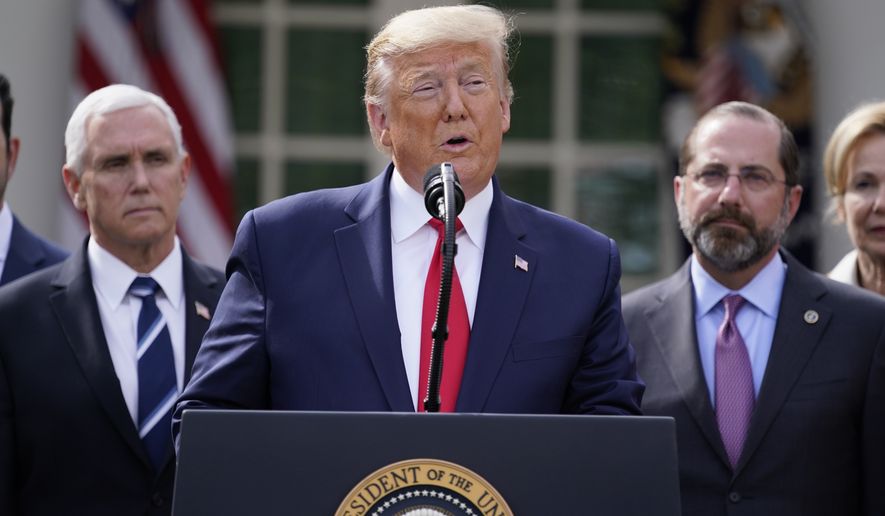President Trump declared a national emergency to deal with the new coronavirus that’s swept the globe and hit the U.S., saying states will get federal money and face fewer obstacles in testing and caring for patients.
“Two very big words,” Mr. Trump said from the White House Rose Garden. “No resource will be spared, nothing whatsoever.”
The designation will invoke the Stafford Act and extend up to $50 billion in aid to states and municipalities. He also ordered states to activate emergency-operation plans.
Mr. Trump said he is temporarily waiving interest on student loans held by federal entities and that he directed the Department of Energy to buy up oil for the Strategic Petroleum Reserve.
Also, his administration will give hospitals and health centers the flexibility to see patients from afar through telehealth and waive certain licensing requirements, so doctors can’t help areas that need them. He’s also waiving restrictions that limit the number of hospital beds in each facility or the length of a patient’s stay.
Mr. Trump also revealed he plans to be tested for the virus.
SEE ALSO: Trump says he’ll probably be tested for coronavirus
“Most likely,” Mr. Trump said. “We’re working out a schedule.”
The president spoke before the closing bell on Wall Street. Stocks soared as he spoke, and top Democrats said they were pleased with the emergency declaration, though told Mr. Trump not to go too far.
“As other steps are considered, the president must not overstep his authority or indulge his autocratic tendencies for purposes not truly related to this public health crisis,” Senate Minority Leader Charles E. Schumer, New York Democrat, said.
Mr. Trump, meanwhile, said House Democrats haven’t “given enough” in negotiations on legislation to deal with the crisis, raising doubts about a deal that appeared to be within reach.
“They’re not doing what’s right for the country,” Mr. Trump said.
Discovered in China last year, the virus and the illness it causes — COVID-19 — has spread to six continents. It has infected over 1,600 people in the U.S., killing 41.
SEE ALSO: Donald Trump urges nation to pray to God for ‘protection and strength’
Most of the deaths have been recorded in counties north of Seattle. A nursing home in Kirkland, Washington, was hit particularly hard.
“We’ve been working very hard on this, we’ve made tremendous progress,” Mr. Trump said, citing his early move to ban travel from China.
He cited the World Health Organization’s designation of Europe as the latest hotspot and his decision to bar foreign nationals from entering the U.S. from a large swath of the continent. American travelers from Europe will be asked to voluntarily quarantine themselves for 14 days.
The president said his decision will save “countless lives.”
However, Mr. Trump said he may add the U.K. to the ban — it’s exempt now — because of its rising case count.
Unlike previous remarks on the outbreak, Mr. Trump acknowledged the stark disruptions that Americans will face. He also hailed sports leagues for suspending play.
“These short-term sacrifices will produce long-term gain,” he said.
Mr. Trump said while younger people may fare well with COVID-19, they risk spreading the virus to older Americans and those with underlying conditions.
“They have not done well,” Mr. Trump said.
Mr. Trump said his administration is working hard to address the dearth of test kits around the nation, citing fast approval of a diagnostic from Roche Holding AG. He said 5 million tests will be developed before the end of the month.
“I doubt we’ll need anywhere need that,” Mr. Trump said.
Google, meanwhile, is working on a website to direct Americans to places where they can get drive-thru testing.
Mr. Trump said it should work better than other government websites — likely a veiled swipe at Obamacare.
The web page will begin with a survey about symptoms and then direct people to sites where they can get swabbed.
Business executives at the White House said they will do everything they can to expand testing, including Walmart, which is freeing up parking lot space at some stores.
Expanded testing will allow disease trackers to pinpoint and isolate infected Americans, slowing transmission and buying time for the development of treatments or a vaccine. States and members of Congress have lashed out at Mr. Trump and his team, saying there’s been a lack of federal leadership and efforts to decentralize FDA control of the test-validation process took too long.
The president said he isn’t to blame for the slow rollout of testing, citing red tape that existed before his presidency.
“I don’t take responsibility at all,” Mr. Trump said, though didn’t explain why he did not rewrite those rules earlier in the outbreak.
Mr. Trump also passed the buck for the dissolution, earlier in his administration, of the part of his National Security Council that was in charge of infectious diseases.
“I don’t know anything about it,” Mr. Trump said, calling it a “nasty” question.
Mr. Trump shook hands with people in the Rose Garden even as experts say the practice should be avoided as one of many “social distancing” techniques to disrupt transmission.
Mr. Trump dined with Brazilian President Jair Bolsonaro in Florida last weekend, only to find out a top press aide to Mr. Bolsonaro, who attended the meetings, later tested positive for the virus.
Mr. Bolsonaro said Friday his own test was negative. An earlier try suggested he was infected, but a second test cleared him.
The president said he hasn’t experienced symptoms, so he’s not worried. Though he was pictured with the aide who tested positive, Mr. Trump said he wasn’t coming back from another country, so he didn’t feel the need to quarantine himself.
• Dave Boyer can be reached at dboyer@washingtontimes.com.
• Tom Howell Jr. can be reached at thowell@washingtontimes.com.




Please read our comment policy before commenting.